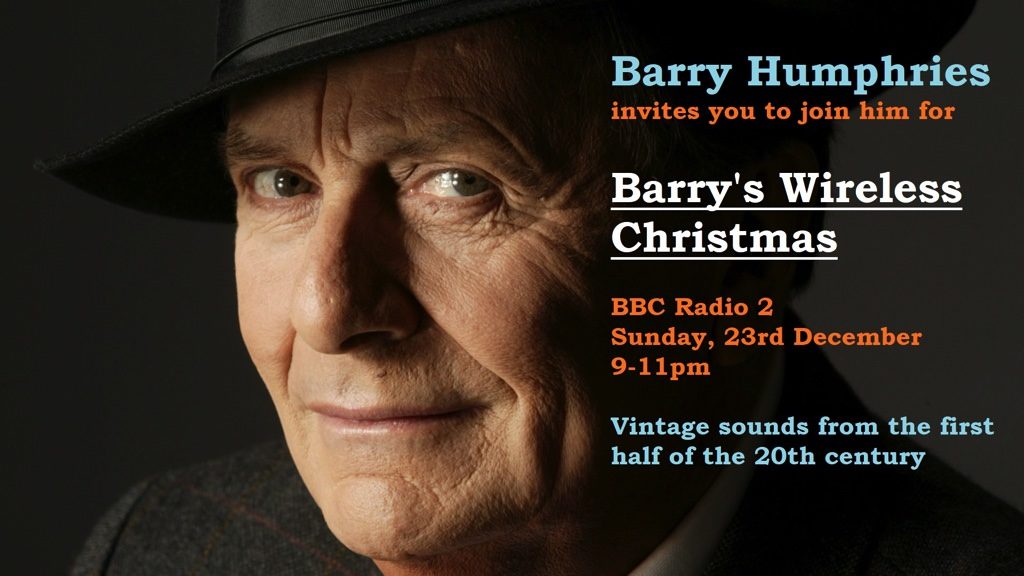Barry’s Forgotten Musical Masterpieces (2019)
BBC Radio 2 in February & March 2019 with a new four-part series.
TX: 10th, 17th, 24th February & 3rd March at 10pm.
Produced for Strauss House Productions by Clair Wordsworth. Themes include Britain’s relationship with Europe, Dance history and Australia’s cultural musical heritage.
Barry says:
“Through these programmes, I’m seeking to give new life to old songs – vintage tracks, which, in my opinion have been undeservedly cast aside, overlooked and forgotten. Many of the songs in these programmes, offer fascinating snapshots of social history and contain advice, which, should any of us choose to listen, is still of great value today. The first half of the 20th century saw great change and challenges, which were reflected upon by many songwriters.”
This vintage music series presented by Barry Humphries refreshes parts other presenters cannot, or dare not, even reach for!
Programme 1: Sunday 17TH March 2019 at 9pm
In this particular programme, Barry offers musical therapy to distressed 21st Century souls on both sides of the Brexit debate. With his Turntable Time Machine spinning at 78 r.p.m., Barry transports listeners back to the sound of the early 20th Century with an exciting assortment of wonderfully quirky British and Continental songs.
Tracks in this programme include: The Eyes of the World Are On You – Louis Levy & His Gaumont British Symphony, Breakaway – Jack Hylton, Rule Britannia A Travestry – Norman Long, Buy British – Clarkson Rose, The Continong & We’re Riding the Tunnel to Gay Paris – North & South (aka Tommy Handley & Ronald Frankau), The Channel Swimmer – Horace Kenney, The Continental – Nat Gonnella, The Cockney Amorist – Sir John Betjeman with music by Jim Parker…
Plus, Barry uncovers the dark fictional plot of the Gershwins’ 1927 musical ‘Strike Up the Band’ which had America going to war with Switzerland over a trivial trade dispute.
Programme 2: Sunday 24th March 2019 at 9pm
Barry Humphries plays Dance Classics from the first half of the 20th Century.
Barry Humphries urges listeners to dust off their dancing shoes in anticipation of the finest Dance Classics from the likes of Fred Astaire, Victor Silvester, the Nicholas Brothers, Florrie Fored & Jack Hylton et al.
In the 2nd programme in this 4-part series, Barry Humphries urges listeners to roll up the carpet and dust of their dancing shoes in anticipation of hearing the finest selection of Dance Classics from the first half of the 20th Century.
Barry takes a brief look at the history of Ballroom dancing and uncovers the origins of dances like the Grizzly Bear, the Turkey Trot and the Kangaroo Hop. Barry also recalls his own traumatic tales of childhood dancing lessons in a church hall in Melbourne given by Mr & Mrs Meyer during the 1940s…
Programme 3: Sunday 31st March 2019 at 9pm
Barry Humphries presents a his favourite Australian early 20th Century Sounds.
In this penultimate programme in this vintage music series, Barry goes Down Under for inspiration and uncovers an intriguing selection of forgotten Australian musical masterpieces.
With is turntable time machine spinning at a rate of 78 r.p.m., Barry Humphries once again refreshes parts other programmes cannot, or dare not, reach!
Song topics range from penal folk ballads (‘Moreton Bay’, ‘Jim Jones of Botany Bay’ & ‘The Wild Colonial Boy’) to those celebrating the country’s top attractions and landmarks (including the Sydney Harbour Bridge), legendary cricketers (Donald Bradman known as The Don) and ground-breaking explorers and aviators (including Kingsford-Smith).
Barry says:
“I’ve only really fallen in love with Australia later in life. When I was young, it seemed, anything of any great worth lay overseas. I blame my parents, who often said things like, ‘you’ll like the new school, Barry, there’s quite a lot of teachers there who have been overseas…’ Back then, Australia seemed a very boring place. I was constantly hankering after something else. I didn’t know what, but I thought that it might be in this mysterious place which people called ‘overseas’”.
Featured tracks include:
‘The Bridge We’ve Been Waiting For’ – written to commemorate the opening of the Sydney Harbour Bridge in 1932, ‘Our Don Bradman’ – written about Australia’s most famous Cricketer and ‘Let’s Take A Trip to Melbourne’…
Programme 4: Sunday 7th April 2019 at 9pm
In the last programme in the series, Barry recalls his favourite childhood listening.
Barry recalls the soundtrack to his childhood, including Fraser Simpson’s music for ‘Toad of Toad Hall’. Barry says, “to this day, that music has a near-hypnotic effect on me”.
In this final programme in the series, Barry Humphries recalls the soundtrack to his early life growing up in Melbourne, Australia during the 1930s & ’40s. Barry’s preferred childhood listening was Fraser Simpson’s music for ‘Toad of Toad Hall’. Barry says: “to this day, that music has a near-hypnotic effect on me. It is utterly charming. We didn’t have a river-bank in Healsville, just outside of Melbourne, but we did have a creek and, in my mind, I somehow transplanted the setting of The Wind in the Willows to where I lived in Australia. The Wild Wood, where the stoats and the weasels lived, brought to my mind, the terrifying Australian Bush.”
In the 1930s and ’40s, inhabitants of Barry’s home city of Melbourne were convinced they were living in a rather remote part of the English home counties. This was reflected in many ways, not least, in the music they listened to on the wireless or gramophone.
Other musical delights on offer in this programme include:
‘Just Like in a Story Book’ – Layton and Johnstone, ‘Other People’s Babies’ – Nora Howard, ‘The Deepest Shelter in Town’ – Florence Desmond…



